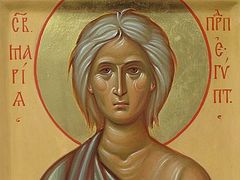This week of Great Lent is a week of profound repentance. At the Liturgy of the Presanctified Gifts, at Vespers we heard twenty-four repentant verses: “O Lord, before I perish utterly, do Thou save me.” In the evening we have the Great Canon with the life of St. Mary of Egypt, and on Thursday, for the sake of this repentant service, we celebrate the Liturgy of the Presanctified Gifts. The following Sunday is also dedicated to her memory.
The Church speaks to us about the power of repentance and gives us an image of how a man can rise up from the abyss of sin to the heights of holiness by the grace of God. Those examples that we heard in the Great Canon forever convince us of one single truth—that there is no sin unforgiven except the sin not repented of. The Church offers us, and we hear about it in all the stichera of Lent, the example of King Manasseh, who committed many crimes: He killed prophets, he ordered the prophet Isaiah to be sawed with a wooden saw, and he worshiped idols. But the Lord pardoned him for his great repentance. The Church also reminds us of King David who committed two terrible crimes, adultery and murder, but the prophetic gift was returned to him through many tears and repentance. The Church tells us about the Ninevites, pagans, who committed many sins, but for their repentance, the Lord pardoned and saved the city from destruction.
In this lies the whole of human life. The main message that the Church addresses to us all, to the whole world, is the message that God, having appeared on Earth, brought to us. What were God’s first words, having become man, in His peaching? Repent, for the Kingdom of Heaven is at hand! There are no hopeless states either for a people, or for the whole of mankind, or for an individual person, because the Lord always offers repentance. “The Lord is so merciful,” says St. John Chrysostom, “He is only mercy.” And this mercy is His nature, exuding from Him. Every sin loses power where there is repentance. “There where there is sincere repentance,” says St. John Chrysostom, “all sins are immediately forgiven this man.” So merciful is our Lord.
However, the holy Church warns us both in the repentant Canon and constantly that this repentance must be true, serious, and deep, because, yes, the Lord is mercy, but sin will not be forgiven if there is no repentance. The holy fathers say that even in the Sacrament of confession, of repentance, where the power of God forgives us all our sins, something incredible happens. “Let all the priests of the world,” says St. Kosmas, “patriarchs and all bishops forgive you your sins in the Sacrament. But if you don’t have any contrition, if you don’t repent, those sins will not be forgiven.”
That means we need to think about how to complete this repentance. What happened with St. Mary of Egypt? What are the signs of true repentance? An external sign of repentance, the holy Church tells us, is when our life changes. A sign that our sin is forgiven is when it is no longer repeated, but is already eliminated from our life. It becomes unbearable for our nature. And an internal sign is when the soul learns freedom of conscience, joy, and ease. And the most authentic sign, the deepest, as the seal of God over our immortal selves, is when we are given to know the grace of the Holy Spirit.
The Lord gave St. Mary of Egypt to know what grace is when she lived in terrible sins, and granted her to see what an obstacle sin is for communion with God. Her answer to this gift from God should ever be before our eyes and should be our constant contemplation. And the Lord has given us to know grace, and everything has changed for us after the Lord forgave us our sins—in the Sacraments of confession and Communion. And the absolute newness of that life for which the Lord created us is opened for us, and everything has become completely different for us, not as it was before.
But if after this we return again to our former sins, what happens in our life? Nothing happens; nothing new is added. Our life becomes again as it was—a life with sin. But the main thing is that the Lord already gave us once to taste of life without sin, when our sins are forgiven by His mercy, by the gift of His crucified love, and our souls feel ease, and joy, and know what is purity. But man returns again to his former sins either out of spiritual laziness, out of lukewarmness, or perhaps out of a strong attachment to a former sin. And everything becomes as before, old, and ancient—as the whole world lives, not knowing repentance, not knowing life without sin. If we had managed to deeply embrace in our hearts that which the Lord gave us, like St. Mary of Egypt, like all the other saints, who differ from us only in this—that with such gratitude, with such depth they embraced this gift of Christ, that their whole lives became a surrender to the Lord—then we would not have returned with such ease to our former, sinful lives.
When we receive the blessed forgiveness of the Lord, when we come to know this new life, we return to what used to happen in our everyday lives—to all of our labors and cares. Days, weeks pass, and, perhaps, we suddenly begin to experience some disappointment, inasmuch as our sins have begun to entwine themselves all the more into this everyday life. It may seem to us that what we once experienced was some sudden delight—perhaps an exaltation, perhaps we experienced an abnormal state, but it is necessary to live as we did before.
Or maybe we will be given to understand what the Lord has revealed to us, and this is the most normal state that a man can be in. And the decision we made under the influence of this moment—to live, in all things pleasing God—was the singular truth. This is the reference point for everything that happens with a man, with all of mankind. By this should all things be measured. Here is the magnetic pole to which our entire life should strive. Here is the center of our life. God is the center of our life, and not “Me myself,” as happened as a result of the Fall, with all my sinful desires and aspirations.
How can we preserve this point of light, this gift from the Lord? That’s the question. How can we acquire firmness in our faithfulness to the goodness and truth that has been revealed to us so authentically by the gift of the Lord? Of course, it does not happen by our good will alone—that’s necessary, but it is the gift of grace, it is the gift of the Church Sacraments here, which are celebrated in the house of God. Our prayer and our determination to preserve fidelity to the goodness and truth revealed to us, must above all be united with a readiness to give our whole lives to the will of the good and perfect God, so that He might accept us as we are, and so that He Himself might shape our lives, perfect them, and bring them to that true state of which we have already been given a foretaste.
Of course, after this we will have new temptations and new difficulties that we cannot avoid. But whenever we recognize what once happened with us, we will know where the exit from these temptations, from these seemingly insurmountable difficulties is—in God, and only in God, Who is ever ready to come to our aid, Who is ever ready to forgive us, whatever sins we may have had; and Who doesn’t simply forgive us our sins, but becomes near to us, and we become one with Him. And we acquire the ability to perceive our whole lives differently, to relate to our sins differently, and to continue with new resolve along this path that we already once began by the gift of Christ in the Church.
Sin and the enemy of mankind have many opportunities, and the devil will find ways to humiliate us and bring us to despair. But our God and the grace of Christ have infinitely more opportunities, which are enough for our entire lives—for eternity,—if we follow the holy path of repentance. Amen.





